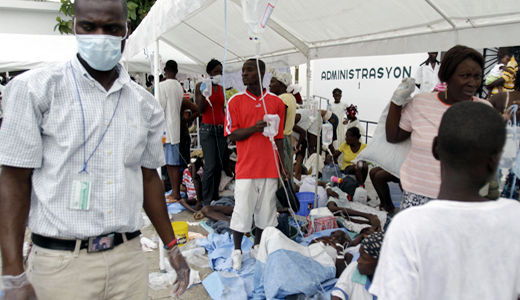
More than 200 people have died in Haiti so far as the result of a cholera outbreak, and at least 1,500 to 2,000 have become ill. Haitian and international health and aid authorities are scrambling to intervene to help those already sick and to prevent the epidemic from spreading both within Haiti and possibly to the neighboring Dominican Republic.
Cholera is a diseased caused by the bacteria Vibrio cholerae. It is transmitted through water, and outbreaks result from conditions of poor sanitation affecting drinking water and water used to prepare food. Symptoms include vomiting and extreme diarrhea which in turn causes rapid dehydration of the body, resulting in organ failure, the immediate cause of death.
If it is detected quickly, it can be cured by a variety of procedures including, crucially, replacing the body fluids. But speed of intervention is essential.
However, in the settings where cholera typically occurs, there may not be clean water and food available, and local health institutions may be quickly overwhelmed by the number of patients produced by the virulence of the disease. Currently, cholera is ravaging Nigeria and Cameroon in Africa. It also broke out in the context of the recent massive flooding in Pakistan.
In Haiti, the first cases believed to be cholera arose as early as last Sunday, in the Artibonite and Mirbalais regions in central Haiti. These areas were not severely damaged by the earthquake which virtually destroyed the capital, Port au Prince, in January, directly killing more than a quarter of a million people. However, many refugees from Port au Prince had moved northward into the Artibonite Valley and have found themselves living in substandard and overcrowded conditions.
That the cholera might spread to Port au Prince, where thousands and thousands of people are still living in makeshift camps, is a very real danger. Since Cholera has not been seen in Haiti for many years there is the added worry that many people probably don’t have much resistance to it.
Initially the World Health Organization was hesitant to classify the disease symptoms as indicating cholera, but Haitian Minister of Public Health Alex Larsen announced that Cuban researchers working with the Haitian ministry of health had confirmed the diagnosis.
Cuba has had a long term health mission in Haiti which usually has 400 or more doctors and other medical personnel scattered around the country. After the January earthquake, many other countries sent in doctors, but most of them have left while the Cubans remain.
The initial cases of cholera showed up at a hospital run by the U.S. based N.G.O. “Partners in Health” in the city of St. Marc on the coast, whose staff were quickly overwhelmed. Now the Haitian Ministry of Health is getting support from the Red Cross, the Pan American Health Organization and other institutions to try to stem the epidemic.
The Haitian Ministry of Health believes that the cholera is being spread by the waters of the Artibonite River, on which hundreds of thousands of people depend. The Artibonite valley happens to be the main rice growing area of Haiti. Some varieties of rice there are grown in flooded fields, similar to those used in Asia. Haitian rice farmers are extremely poor and have been getting poorer.
So-called “free trade” imposed upon Haiti by the United States in the 1990s as a condition for helping former President Jean-Bertrand Aristide return to power after a military coup, had a disastrous effect on Haitian rice agriculture. The virtual elimination of import tariffs on rice has so undermined Haitian rice agriculture that thousands of farmers have had to give it up entirely and seek work in the capital. This is one reason Port au Prince was so overcrowded when the earthquake hit.
This April, former U.S. President Bill Clinton, now assigned by the United Nations to coordinate international help for Haiti, admitted that this U.S. policy benefited large rice producers in his home state of Arkansas but hurt the Haitian people . However, the trade policy continues, as the international community focuses on setting up offshore industries in Haiti which will attract direct foreign investment (DFI) by offering a low-wage work force.
After the January earthquake, many countries promised massive aid to Haiti. Venezuela cancelled Haiti’s debts and Cuba increased its already substantial medical aid. However aid needed to reconstruct housing and crucial infrastructure has been moving very slowly.
Photo: People receive serum in the parking lot of a crowded hospital, in Saint Marc, Haiti, Oct. 21. Dieu Nalio Chery/AP












Comments